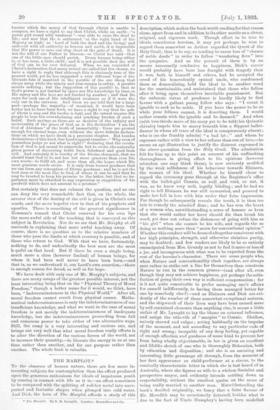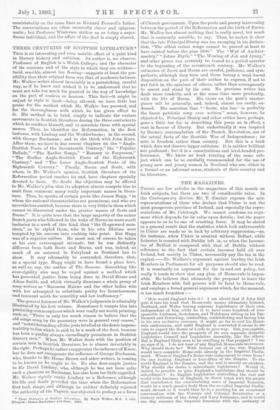THE MARPLOT.* To the observer of human nature, there are
few more in- teresting subjects for contemplation than the effect produced upon the generous enthusiasm for ideals of impetuous youth by coming in contact with life as it is,—an effect sometimes to be compared with the splitting of red-hot metal into unex- pected and fantastic shapes when plunged into cold water. And Dick, the hero of The Marplot, affords a study of this * The Marylet. By S. R. Lysaght. London: Macmillan and Co, description, which makes the book worth reading for that reason alone, apart from and in addition to its other merits as a clever, original, and vigorous work. Though effort to be true to ideals constitutes heroism, it may yet perhaps be wise to regard them somewhat as Arthur regarded the Quest of the Holy Grail ; that is to say, as tending to cause loss of "chance of noble deeds" in order to follow "wandering fires" into the quagmire. And as the pursuit of them is by no means necessarily conducive to happiness, Dick's career would probably have been less fraught with tragedy than it was, both to himself and others, had he accepted the creed of his benevolently cynical uncle, who condemned them as demoralising, held the ideal to be another word for the unattainable, and maintained that those who follow after it bring upon themselves inevitable punishment. But the unheroic virtue of prudence is hardly likely to find favour with a gallant young fellow who says : "I count it ignoble to seek to be noble. If you have the power to be so while your fellows cannot, it is deserting them. I would rather remain with the ignoble and be damned." And when (with two-thirds more of his story yet to be told) his Quixotic chivalry impels him to mar7 beneath him a flippant ballet- dancer in whom all trace of the ideal is conspicuously absent ; who is (as she frankly admits) "a bad lot ; " and whom he espouses rather with a view to her reform than out of love,—he seems an apt illustration to justify the distrust expressed in the above quotation from the Holy Grail, The admiration felt for him up to this point on account of his unflinching thoroughness in giving effect to his opinions (however mistaken one may think them), is now seriously modified by the weak selfishness of his behaviour towards Elsinore, the woman of his ideal. Whether he himself chose to regard the ceremony gone through at the Registrar's office with the ballet-girl Connie, as null and void, or not, it was, as he knew very well, legally binding ; and he had no right to tell Elsinore he was still unmarried, and proceed to make her fall in love with him under that false impression. For though he subsequently reveals the truth, it is then too late to remedy the mischief done; and he has won the heart of a woman who, notwithstanding a sense of honour so keen that she would rather her lover should die than break his word, yet does not refuse the dishonour of going with him as "his girl" when she cannot be his wife, and regards the so doing as nothing more than "scorn for conventional opinion." Whether this conduct will be deemed altogether consistent with her high principles, strength, and otherwise stainless purity, may be doubted ; and few readers are likely to be so entirely emancipated from Mrs. Grundy as not to feel it more or less of a jar, and incongruous with what was to be expected from the rest of the heroine's character. There are some people who, when Nature and conventionality clash together, are always sure rather to strike out a line for themselves than constrain Nature to run in the common groove—(and after all, even though they may not achieve happiness, yet perhaps the satis- faction of going their own way is sufficient compensation ; for is it not quite conceivable to prefer managing one's affairs for oneself indifferently, to having them managed better for one by somebody else ?)—and as Elsinore and Dick are evi- dently of the number of these somewhat exceptional natures, and the shipwreck of their lives may have been caused more by self-contained elements than anything else, it seems a little unfair of Mr. Lysaght to lay the blame on external influence, and assign the title-role of " marplot " to Connie. Shallow, naïvely shrewd and vulgar; acting habitually on the impulse of the moment, and not according to any particular code of right and wrong; incapable of any deep feeling, yet capable of enough affection and goodness of some kind to prevent her from being wholly objectionable, in her is given an excellent and lifelike sketch of one who is thoroughly Bohemian, both by education and disposition ; and she is an amusing and interesting little personage all through, from the moment of her first appearance as Ail d.performer at a circus, to the comically characteristic letter in which she is last heard of in Australia, where she figures as wife to a whilom Socialist and prospective mayor, and evidently intends settling down to respectability, without the smallest qualm on the score of being really married to anothk- man. Notwithstanding the book's decided originality, we fancy that a faint flavour of Mr. Meredith may be occasionally detected, besides what is due to the fact of Uncle Humphry's having been modelled unmistakably on the same lines as Richard Feverell's father. The conversations are often unusually clever and epigram- matic; but Professor Wintersea strikes us as being a super- fluous individual, and the affair of the duel is simply absurd.











































 Previous page
Previous page